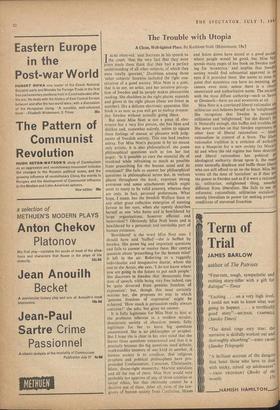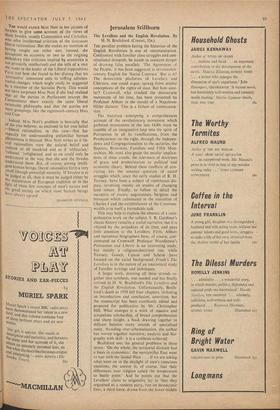The Trouble with Utopia
A Clean, Well-lighted Place. By Kathleen Nott. (Heinemann, 18s.) TALSO observed.' said Socrates in his speech to the court, 'that the very fact that they were poets made them think that they had a perfect understanding of all other subjects, of which they were totally ignorant.' Doubtless among those 'other subjects' Socrates included the right con- stitution of a good society. Miss Nott is a poet, that is to say, an artist, and her intuitive percep- tion of Sweden and its people makes pleasurable reading. She shudders in the right places. expands and glows in the right places (these are fewer in number), like a delicate electronic apparatus. Her book is as near as you will get to feeling present- day Sweden without actually going there.
But since Miss Nott is not a piece of elec- tronics but a very live person, she has likes and dislikes and, somewhat naively, seems to equate these feelings of unease or pleasure with judg- ments of Swedish society. This can lead readers astray. For Miss Nott's purpose is by no means only artistic, it is also philosophical; she poses philosophical questions such as (on her last page): 'Is it possible to cure the material ills of mankind while refraining as much as possible from prescribing for the human mind and its emotions?' She fails to answer her philosophical questions in philosophical terms but, in various places throughout the book, expresses strong aversions and some attachments which might seem to many to be valid answers, whereas they are only, in fact, personal preferences. What hope, I mean, has the Swedish Welfare State or any other great collective enterprise of meeting favour in her eyes, when she openly describes herself as one 'who hates and is bewildered by large organisations, however efficient and benevolent'? Obviously Miss Nott hates and is bewildered by a persistent and inevitable part of human existence.
'Bewildered' is the word Miss Nott uses. I should have said `baftled'—she is baffled by Sweden. She poses big and important questions and fails to answer or resolve them. Her central question about 'prescribing for the human mind' is left in the air. Referring to a ruggedly individualist and imaginative doctor, whom she met in the Arctic, she says, 'I do not know where you are going in the future to put such people.' She discovers in Sweden that 'democratic free- dom of speech, while being very free indeed, can be quite divorced from genuine freedom of expression'; but, though this most certainly worries her, she proposes no way in which 'genuine freedom of expression' might be achieved. 'How much is persuasion really always coercion?' she asks, but gives no answer.
It is fully legitimate for Miss Nott to hint at the problems inherent in a modern secular, democratic society of abundant means, fully legitimate for her to leave big questions unanswered. She is no philosopher or prophet. But I hope she is clear in her own mind that she leaves those questions unanswered and that it is precisely because the big questions need definite, workmanlike answers of one kind or another, if human society is to continue, that religious prophets and political philosophers have pro- pounded Confucianism, Ctesarism, Christianity, Islam, divine-right monarchy, Marxist socialism and all the rest of them. Miss Nott would very probably not approve of any of those societies or social ethics, but that obviously cannot be a decisive test of them. After all, most of the law- givers of human society from Confucius, Moses
and Solon down have aimed at a good societi where people would be good, but Miss No spends many pages of her book on Sweden loot ing for 'eccentrics,' and implies that Swedis society would find substantial approval in h eyes if it provided them. She seems to miss point that eccentrics can have no meaning, a cannot even exist, unless there is a clear enunciated and authoritative norm. The societi with the most diffuse authority—such as Sam or Denmark—have no real eccentrics at all Miss Nott is a convinced liberal rationalist an utilitarian and believes herself to be 'enlightene She recognises that Sweden is rationali utilitarian and 'enlightened,' but she doesn't 111c it. Naturally enough, this baffles and troubles h She never catches on that Sweden represents other face of liberal rationalism — libe rationalism in control of a State. The libe rationalist tradition is a criticism of author not a blueprint for a new society (as MarxiS is) and when the old regime has been destroY and liberal rationalism has political a ideological authority thrust upon it, the resit1 must naturally displease and baffle those (iber who can still afford to sit on the fence. Miss No' writes all the time of 'socialism' as if that We the power in Sweden and as if it were a rationalii tic, utilitarian, enlightened thing, somehoc different from liberalism. She fails to see th reformist, rationalistic, utilitarian socialism , merely liberalism in power (or seeking power)' conditions of universal franchise. You would expect Miss Nott in her picture of Sweden to give some account of the views of those Swedes, mostly Communists and Catholics. Who offer intellectual criticism of the dominant liberal rationalism. But she makes no mention of having sought out either sort. Instead, she Juxtaposes an eccentric or two to the reigning orthodoxy (the criticism implied by eccentrics is not primarily intellectual) and she tells of a visit she inade to the leader of the Liberal (opposition) P.m), and how she found to her dismay that his alternative amounted only to trifling adminis- trative changes, which might easily be suggested 4 a member of the Socialist Party. This would not have surprised Miss Nott if she had realised that all the parties in Parliament (except the Communists) share exactly the same liberal rationalist philosophy and that the parties are mere groupings, like the eighteenth-century Hats and Caps Indeed, Miss Nutt's problem is basically that ol the true believer, so enclosed in her true belief —liberal rationalism, in this case—that her capacity for understanding unfamiliar human Phenomena is blunted. Miss Nott writes as if lib- eral rationalism were the natural belief and .outlook of all mankind and as if 'utilitarian,' rational,- enlightened and so on could only be understood in the way that she and the Swedes understand them. But, of course, among intelli- gent human beings, liberal rationalists form a very small (though powerful) minority. If Sweden is to he judged at all, then it must be judged either by the mainstream of European tradition or in the llght of those few concepts of man's nature and the good society on which most human beings have always agreed



























































 Previous page
Previous page